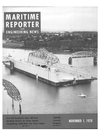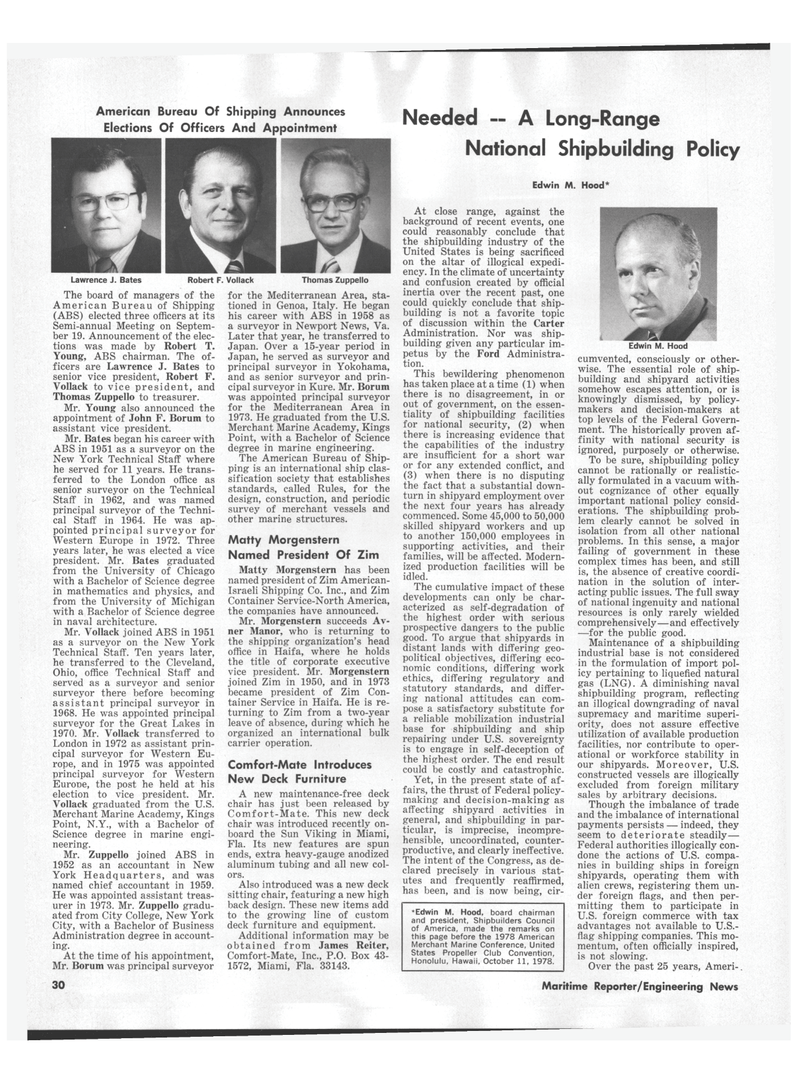
Page 34: of Maritime Reporter Magazine (November 1978)
Read this page in Pdf, Flash or Html5 edition of November 1978 Maritime Reporter Magazine
American Bureau Of Shipping Announces
Elections Of Officers And Appointment Needed — A Long-Range
National Shipbuilding Policy
Lawrence J. Bates Robert F. Vollack Thomas Zuppello
The board of managers of the
American Bureau of Shipping (ABS) elected three officers at its
Semi-annual Meeting on Septem- ber 19. Announcement of the elec- tions was made by Robert T.
Young, ABS chairman. The of- ficers are Lawrence J. Bates to senior vice president, Robert F.
Vollack to vice president, and
Thomas Zuppello to treasurer.
Mr. Young also announced the appointment of John F. Borum to assistant vice president.
Mr. Bates began his career with
ABS in 1951 as a surveyor on the
New York Technical Staff where he served for 11 years. He trans- ferred to the London office as senior surveyor on the Technical
Staff in 1962, and was named principal surveyor of the Techni- cal Staff in 1964. He was ap- pointed principal surveyor for
Western Europe in 1972. Three years later, he was elected a vice president. Mr. Bates graduated from the University of Chicago with a Bachelor of Science degree in mathematics and physics, and from the University of Michigan with a Bachelor of Science degree in naval architecture.
Mr. Vollack joined ABS in 1951 as a surveyor on the New York
Technical Staff. Ten years later, he transferred to the Cleveland,
Ohio, office Technical Staff and served as a surveyor and senior surveyor there before becoming assistant principal surveyor in 1968. He was appointed principal surveyor for the Great Lakes in 1970. Mr. Vollack transferred to
London in 1972 as assistant prin- cipal surveyor for Western Eu- rope, and in 1975 was appointed principal surveyor for Western
EuroDe, the post he held at his election to vice president. Mr.
Vollack graduated from the U.S.
Merchant Marine Academy, Kings
Point, N.Y., with a Bachelor of
Science degree in marine engi- neering.
Mr. Zuppello joined ABS in 1952 as an accountant in New
York Headquarters, and was named chief accountant in 1959.
He was appointed assistant treas- urer in 1973. Mr. Zuppello gradu- ated from City College, New York
City, with a Bachelor of Business
Administration degree in account- ing.
At the time of his appointment,
Mr. Borum was principal surveyor for the Mediterranean Area, sta- tioned in Genoa, Italy. He began his career with ABS in 1958 as a surveyor in Newport News, Va.
Later that year, he transferred to
Japan. Over a 15-year period in
Japan, he served as surveyor and principal surveyor in Yokohama, and as senior surveyor and prin- cipal surveyor in Kure. Mr. Borum was appointed principal surveyor for the Mediterranean Area in 1973. He graduated from the U.S.
Merchant Marine Academy, Kings
Point, with a Bachelor of Science degree in marine engineering.
The American Bureau of Ship- ping is an international ship clas- sification society that establishes standards, called Rules, for the design, construction, and periodic survey of merchant vessels and other marine structures.
Matty Morgenstern
Named President Of Zim
Matty Morgenstern has been named president of Zim American-
Israeli Shipping Co. Inc., and Zim
Container Service-North America, the companies have announced.
Mr. Morgenstern succeeds Av- ner Manor, who is returning to the shipping organization's head office in Haifa, where he holds the title of corporate executive vice president. Mr. Morgenstern joined Zim in 1950, and in 1973 became president of Zim Con- tainer Service in Haifa. He is re- turning to Zim from a two-year leave of absence, during which he organized an international bulk carrier operation.
Comfort-Mate Introduces
New Deck Furniture
A new maintenance-free deck chair has just been released by
Comfort-Mate. This new deck chair was introduced recently on- board the Sun Viking in Miami,
Fla. Its new features are spun ends, extra heavy-gauge anodized aluminum tubing and all new col- ors.
Also introduced was a new deck sitting chair, featuring a new high back design. These new items add to the growing line of custom deck furniture and equipment.
Additional information may be obtained from James Reiter,
Comfort-Mate, Inc., P.O. Box 43- 1572, Miami, Fla. 33143.
Edwin M. Hood"
At close range, against the background of recent events, one could reasonably conclude that the shipbuilding industry of the
United States is being sacrificed on the altar of illogical expedi- ency. In the climate of uncertainty and confusion created by official inertia over the recent past, one could quickly conclude that ship- building is not a favorite topic of discussion within the Carter
Administration. Nor was ship- building given any particular im- petus by the Ford Administra- tion.
This bewildering phenomenon has taken place at a time (1) when there is no disagreement, in or out of government, on the essen- tiality of shipbuilding facilities for national security, (2) when there is increasing evidence that the capabilities of the industry are insufficient for a short war or for any extended conflict, and (3) when there is no disputing the fact that a substantial down- turn in shipyard employment over the next four years has already commenced. Some 45,000 to 50,000 skilled shipyard workers and up to another 150,000 employees in supporting activities, and their families, will be affected. Modern- ized production facilities will be idled.
The cumulative impact of these developments can only be char- acterized as self-degradation of the highest order with serious prospective dangers to the public good. To argue that shipyards in distant lands with differing geo- political objectives, differing eco- nomic conditions, differing work ethics, differing regulatory and statutory standards, and differ- ing national attitudes can com- pose a satisfactory substitute for a reliable mobilization industrial base for shipbuilding and ship repairing under U.S. sovereignty is to engage in self-deception of the highest order. The end result could be costly and catastrophic.
Yet, in the present state of af- fairs, the thrust of Federal policy- making and decision-making as affecting shipyard activities in general, and shipbuilding in par- ticular, is imprecise, incompre- hensible, uncoordinated, counter- productive, and clearly ineffective.
The intent of the Congress, as de- clared precisely in various stat- utes and frequently reaffirmed, has been, and is now being, cir- *Edwin M. Hood, board chairman and president, Shipbuilders Council of America, made the remarks on this page before the 1978 American
Merchant Marine Conference, United
States Propeller Club Convention,
Honolulu, Hawaii, October 11, 1978.
Edwin M. Hood cumvented, consciously or other- wise. The essential role of ship- building and shipyard activities somehow escapes attention, or is knowingly dismissed, by policy- makers and decision-makers at top levels of the Federal Govern- ment. The historically proven af- finity with national security is ignored, purposely or otherwise.
To be sure, shipbuilding policy cannot be rationally or realistic- ally formulated in a vacuum with- out cognizance of other equally important national policy consid- erations. The shipbuilding prob- lem clearly cannot be solved in isolation from all other national problems. In this sense, a major failing of government in these complex times has been, and still is, the absence of creative coordi- nation in the solution of inter- acting public issues. The full sway of national ingenuity and national resources is only rarely wielded comprehensively—and effectively —for the public good.
Maintenance of a shipbuilding industrial base is not considered in the formulation of import pol- icy pertaining to liquefied natural gas (LNG). A diminishing naval shipbuilding program, reflecting an illogical downgrading of naval supremacy and maritime superi- ority, does not assure effective utilization of available production facilities, nor contribute to oper- ational or workforce stability in our shipyards. Moreover, U.S. constructed vessels are illogically excluded from foreign military sales by arbitrary decisions.
Though the imbalance of trade and the imbalance of international payments persists — indeed, they seem to deteriorate steadily—
Federal authorities illogically con- done the actions of U.S. compa- nies in building ships in foreign shipyards, operating them with alien crews, registering them un- der foreign flags, and then per- mitting them to participate in
U.S. foreign commerce with tax advantages not available to U.S.- flag shipping companies. This mo- mentum, often officially inspired, is not slowing.
Over the past 25 years, Ameri-. 12 Maritime Reporter/Engineering News

 33
33

 35
35
